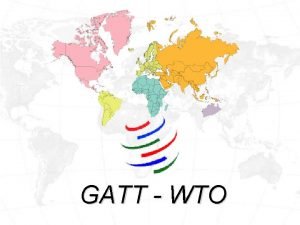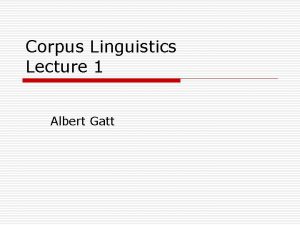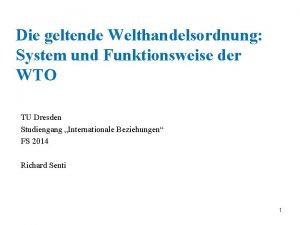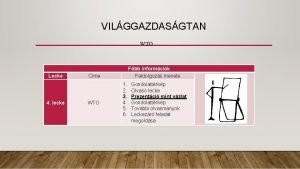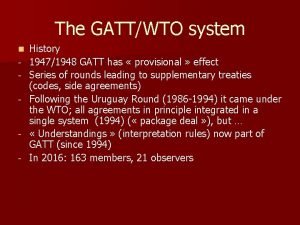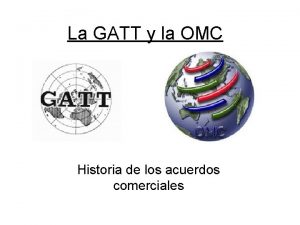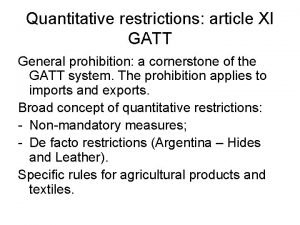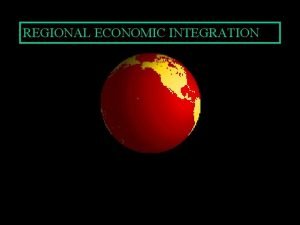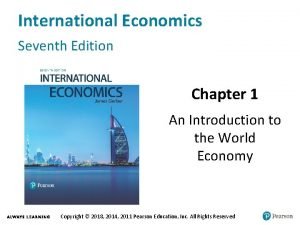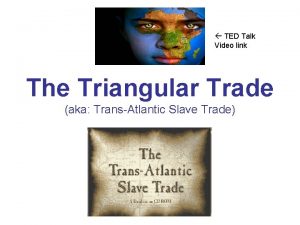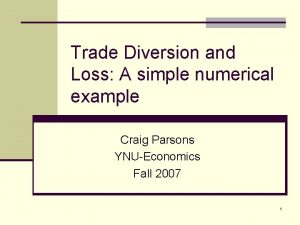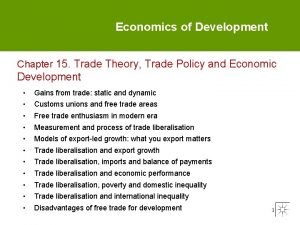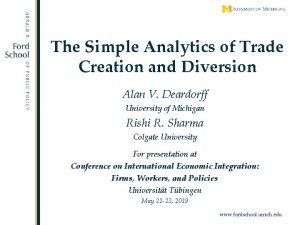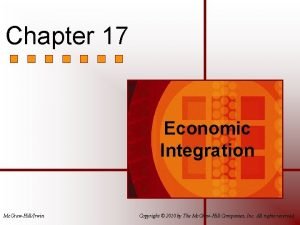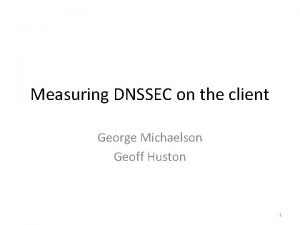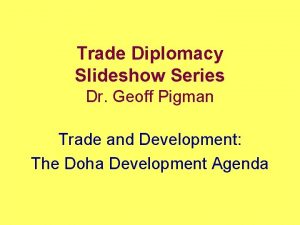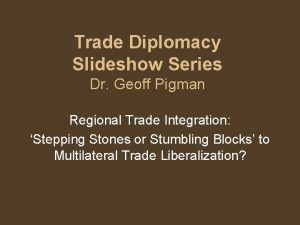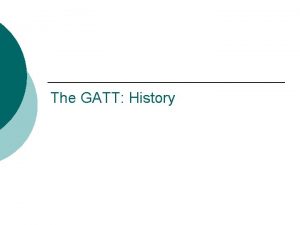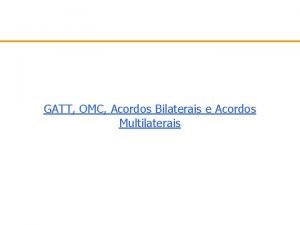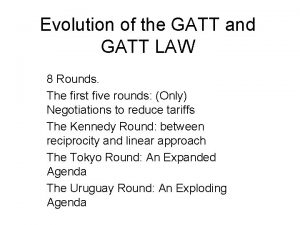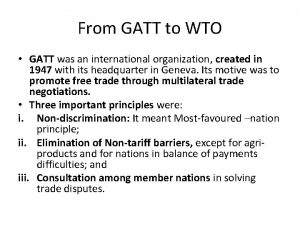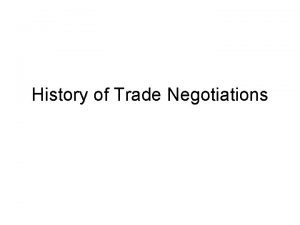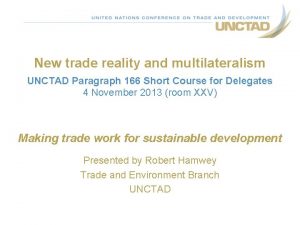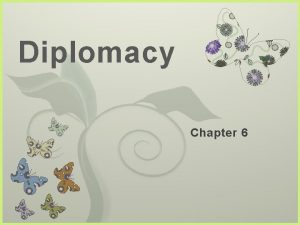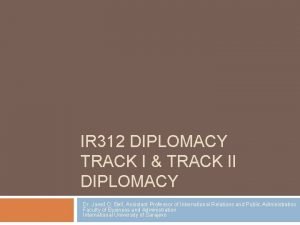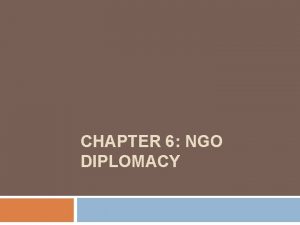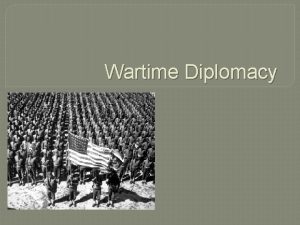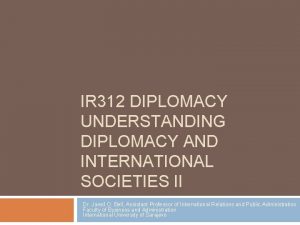Trade Diplomacy Dr Geoff Pigman Multilateralism the GATT





























- Slides: 29

Trade Diplomacy Dr. Geoff Pigman Multilateralism, the GATT, and the World Trade Organization

The post-World War II international economy: the Bretton Woods principles • Currency convertibility • Economic reconstruction and development • Liberal trade and open markets The Bretton Woods triad: IMF, IBRD, ITO TD Topic 5 2

Basic GATT 1947 principles: an Anglo-American compromise at Bretton Woods • Non-discrimination - general Most Favoured Nation treatment • National treatment for imported goods • Tariff reductions TD Topic 5 3

The GATT: a rulebook for an organization that wasn’t • The Havana Charter - non-ratification of the ITO • General Agreement on Tariffs and Trade 1947: the rulebook • 23 industrial country signatories - 75% of world trade • A system of principles and rules TD Topic 5 4

Why reform GATT in the 1980 s? US domestic trade policy problems • Lax first Reagan Admin (‘ 81 -’ 85) trade policy • Industry seeks remedies through domestic trade law: AD, CVD – lobbies Congress for tougher trade laws - less Presidential discretion • Reagan monetary policy: US dollar rollercoaster • Stronger second Reagan Admin (’ 85 -9) trade policy – More negotiations on trade conflicts – More aggressive use of administered trade remedies – Negotiated bilateral and multilateral trade agreements TD Topic 5 5

Too little, too late? The Omnibus Trade Act of 1988 • Shifted presidential discretion on retaliation under several existing remedies to USTR • Super 301 - Market Access – President to list offending countries, practices – Mandatory bilateral market opening negotiations – Insufficient progress in 6 months => mandatory retaliation • 1989 list: Japan, Brazil, India • 1990 list: India TD Topic 5 6

International trading system issues in the 1980 s and the Uruguay Round • Growth of trade in services • Rise of new competitor countries – Taiwan, Hong Kong, Singapore, South Korea • Tensions over trade dispute resolution • NTBs an increasing problem • Developing countries acquired increased political clout • Agricultural trade barriers TD Topic 5 7

‘Trade’ in services – new ground for the GATT: GATS • Crucial for export politics – concessions sought from developing countries • Reconceptualizing cross-border sales of services as ‘trade’ • Four modes of supply 1. cross-border supply 2. consumption abroad 3. commercial presence 4. movement of ‘natural persons’ TD Topic 5 8

1993: why a WTO now? • GATT (1947) as rulebook for failed ITO – ad hoc GATT secretariat (Geneva) – contractual negotiating forum – voting by consensus – negotiations: principal supplier rule • Need for coherence and integration of Tokyo Round agreements, more effective dispute settlement – John Jackson proposes WTO – Sylvia Ostry: ‘Grand Bargain’ TD Topic 5 9

Concluding the Uruguay Round: the Treaty of Marrakech 1994 • GATT 1994 • General Agreement on Trade in Services (GATS) • Trade-related Investment Measures (TRIMS) • Trade-related Intellectual Property agreement (TRIPs) • Dispute Settlement Mechanism (DSM) • World Trade Organization (WTO) TD Topic 5 10

The WTO ‘Grand Bargain’ What they gave up What they got INDUSTRIAL COUNTRIES textile import quotas DEVELOPING tariff bindings - goods COUNTRIES costly to implement SPS, TBT, customs valuation, TRIMs, services opening TD Topic 5 kept tariff peaks, most ag protection; TRIPs, SPS, TBT, customs valuation, TRIMs tariff cuts on goods? textile markets (late) AD duties Services export markets 11

What makes the WTO different from the GATT? -1 • A full-blown international organization – membership structure and obligations – more powerful secretariat – Trade Policy Review Mechanism (TPRM) • benchmarking, or ‘name and shame’ – An end to grandfathering of domestic law TD Topic 5 12

What makes the WTO different from the GATT? -2 • Accession: the ‘Single Undertaking’ – goods, services, TRIMs, TRIPs, DSU • More intrusive mandate: services, TRIPs, TRIMS, SPS and TBT in goods • Stepped up, faster dispute settlement – from positive to ‘negative consensus’ TD Topic 5 13

The WTO’s ‘new’ home – Centre William Rappard, Geneva: plus ça change? The building had been home to the GATT since the 1950 s. TD Topic 5 14

WTO Diplomacy • Member governments send permanent representatives to the WTO • Members set agendas, schedules for meetings of councils, committees, etc. • Informal meetings common: Green Rooms etc • NGOs, interest groups have no formal standing but increasing influence – consultation – limited accreditation to meetings – amicus curiae briefs to Appellate Body TD Topic 5 15

The politics of WTO decisionmaking: two paradoxes • Rule making: – very improvised rule-making procedure; but – highly legalistic rule enforcement (DSM) – reflects, constitutes power imbalance between industrial and developing countries • Voting: formally one country, one vote – mostly simple majorities required – but GATT norm of consensus persists – nemini contestavit (nem con) TD Topic 5 16

Do negotiating approaches disadvantage developing countries? • Principal supplier principle (request-offer) • Choosing tariff cutting formulas – linear vs. harmonizing • Multilateral issue linkage • WTO accession negotiations • Organizational culture and negotiating strategy – pie-splitting vs. pie-creating TD Topic 5 17

After Marrakech: different priorities from the start Developing countries: • implementation – getting industrial countries to meet Uruguay Round obligations • S&DT • Market access Industrialized countries: • 1996 Singapore Ministerial Conference – ‘Singapore issues’ • investment • competition • trade facilitation • govt. procurement TD Topic 5 18

Launching the first ‘WTO’ round • The unfinished agenda • Rolling out the bicycle theory again • A ‘Millennium Round’ – resistance amongst WTO members – Battle of Seattle – civil society • 9/11 changes the context – global recession = al-Qa’eda wins – ‘on yer bike’: Doha Round launched 11/2001 TD Topic 5 19

The ‘Battle of Seattle’ 1999: what changed? DIFFERENT SAME • Mobilization of global • ‘Green Room’ style civil society negotiation – neoliberal globalization • US-EU agriculture contested dispute • US sought a narrow • Approach to agenda: agenda breadth vs. achievability – no asymmetric benefits • Emerging North-South polarization TD Topic 5 20

Doha negotiating objectives INDUSTRIAL POWERS • Negotiations as usual • Conservative strategy: ‘avoid disaster’ • Singapore issues: • US: end agricultural export subsidies DEVELOPING COUNTRIES • Economic development through trade – agriculture • Complete/roll back goals of earlier rounds • Alter-globalization • ‘Special & differential treatment’ (S&DT) TD Topic 5 21

Doha Round deadlock: rise of developing country power • ‘Doha Development Agenda’ (DDA) • Special and Differential Treatment (S&DT) • Developing country coalitions: Like Minded Group (LMG), WTO G-20, NAMA-11, Cotton Four, G-33 • BRICS break up the Old Quad: G 5, G 6, G 7 TD Topic 5 22

Coalitions in the Doha Round • ‘Decision-making groups’ vs. coalitions – Quad, G 4, New Quad, WTO G 7 • Bargaining coalition types – issue-based: single issue, limited duration – bloc-type: multiple issue, enduring • Coalitions are particularly important to developing countries – technical limitations – small size TD Topic 5 23

Why should developing countries join coalitions? (Narlikar) • Defection hypothesis – ready to defect in return for industrial country concessions on a particular issue • Collective gains hypothesis – set collective demands higher than potential individual gains from defection – large members offer smaller members side payments (market access) TD Topic 5 24

The coalitions of Cancun 2003 • Going in: the WTO ‘G-20’ • The ‘Core Group’ – explicit consensus necessary to negotiate • Alliance on Strategic Products and Special Safeguard Mechanism • G-90 – broad group of developing countries – resist Singapore Issues – Special & differential treatment – erosion of developing country preferences – rapid liberalization of NAMA TD Topic 5 25

Civil society at Cancun TD Topic 5 26

Doha coalitions after Cancun • G 4/G 6 – US, EU, Brazil, India (plus Japan, Australia) – G 7: G 6 plus China • ‘G-20’: advocated more S&DT • NAMA-11: sought flexibility to safeguard against import surges in manufactured goods • Ismail: developing countries move from welfare interests to agency interests TD Topic 5 27

Proposed ‘fixes’ for the WTO • Decision-making: consultative board – negotiating efficiency vs. transparency/ equality/participation • Process: rule-driven vs. improvised diplomacy • Mandate: include new issues? – agenda too wide or narrow: trade vs. other values – national vs. supranational powers • ‘Democratic deficit’? TD Topic 5 28

WTO Bali Ministerial, Dec. 2013 • Doha Round: ‘I’m not dead yet…’ • Picking a few low-hanging fruit – – Trade facilitation (Singapore) Agriculture: food safety, etc. Cotton Development/S&DT/LDC market access • DG Azevedo used open consultative process from Geneva to Bali – did away with Green Rooms • Developing countries: leadership & learning TD Topic 5 29
 Rundy gatt
Rundy gatt Albert gatt
Albert gatt Gatt logo
Gatt logo Gatt abkommen
Gatt abkommen Jag har gått inunder stjärnor text
Jag har gått inunder stjärnor text Gatt alapelvek
Gatt alapelvek History of wto
History of wto Business environment
Business environment Gatt-omc
Gatt-omc Gatt logo
Gatt logo Article xi of gatt
Article xi of gatt Tlfax
Tlfax The pigman and me summary
The pigman and me summary The pigman and me
The pigman and me Pigman chapter 13 summary
Pigman chapter 13 summary Which is the most enduring free trade area in the world?
Which is the most enduring free trade area in the world? Tramp shipping and liner shipping
Tramp shipping and liner shipping The trade in the trade-to-gdp ratio
The trade in the trade-to-gdp ratio What is triangle trade
What is triangle trade Trade diversion and trade creation
Trade diversion and trade creation Fair trade not free trade
Fair trade not free trade Trade diversion and trade creation
Trade diversion and trade creation Trade diversion and trade creation
Trade diversion and trade creation Geoff layer
Geoff layer Icedip model full form
Icedip model full form Geoff michaelson
Geoff michaelson Geoff hayward
Geoff hayward Geoff baines
Geoff baines Geoff savage
Geoff savage Geoff barton dundee
Geoff barton dundee
